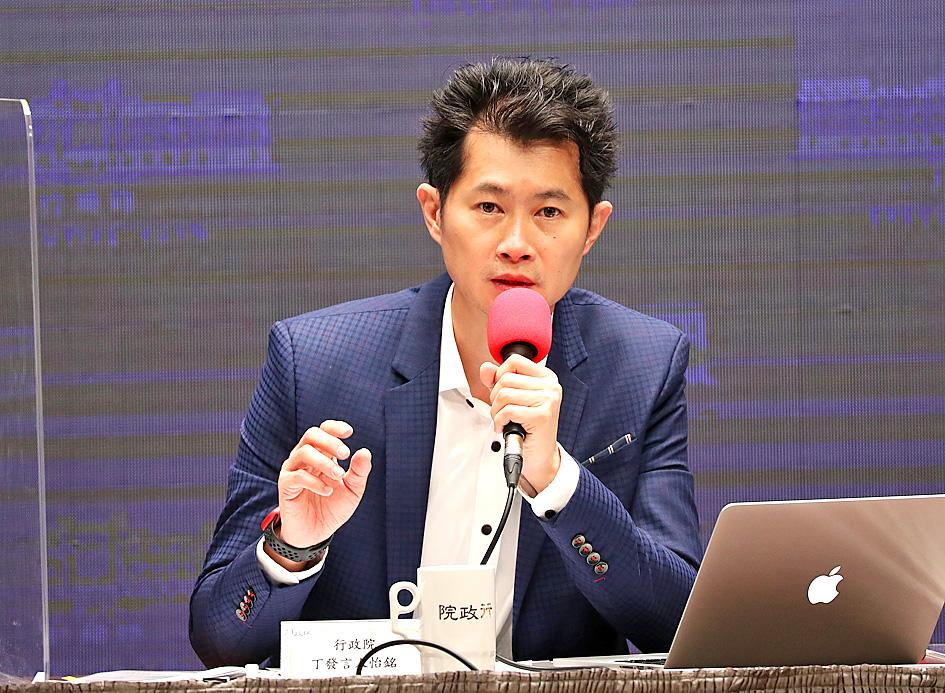The Department of Cyber Security is probing an alleged leak of Taiwan’s household registration information and would update the public when more information becomes available, Executive Yuan spokesman Ting Yi-ming (丁怡銘) said yesterday.
Ting’s remarks came after US-based cybersecurity firm Cyble on Friday said that it had discovered a leaked database — purportedly belonging to the government — containing the household registration information of more than 20 million Taiwanese.
The information contained in the 3.5 gigabyte database, titled “Taiwan whole country home registry DB,” allegedly includes people’s full names, addresses, national identification number, gender, date of birth and other information, it said.

Photo: CNA
The firm said that the database was discovered by one of its researchers on the dark Web a few weeks ago and was dropped by a well-known person who goes by the handle “Toogod.”
The leak occurred last year and originated from the Ministry of the Interior’s Department of Household Registration, Cyble said, citing Toogod.
It is unusual for an entire nation’s government data to be leaked, the company said, adding that it was investigating the matter.
Some of the entries in the database have been identified as information that date back “a long time,” Ting said yesterday.
The department and police are working to determine the authenticity of the data, he said.
A preliminary investigation has ruled out that the data are people’s household registration information and that they were leaked by a government agency, he added.
There are two versions of the database, one consisting of an aggregate of the entries and the other in which entries are categorized by administrative regions in the nation, Ting said, adding that the database is more likely a combination of information from several sources.

Taiwan is stepping up plans to create self-sufficient supply chains for combat drones and increase foreign orders from the US to counter China’s numerical superiority, a defense official said on Saturday. Commenting on condition of anonymity, the official said the nation’s armed forces are in agreement with US Admiral Samuel Paparo’s assessment that Taiwan’s military must be prepared to turn the nation’s waters into a “hellscape” for the Chinese People’s Liberation Army (PLA). Paparo, the commander of the US Indo-Pacific Command, reiterated the concept during a Congressional hearing in Washington on Wednesday. He first coined the term in a security conference last

Prosecutors today declined to say who was questioned regarding alleged forgery on petitions to recall Democratic Progressive Party (DPP) legislators, after Chinese-language media earlier reported that members of the Chinese Nationalist Party (KMT) Youth League were brought in for questioning. The Ministry of Justice Investigation Bureau confirmed that two people had been questioned, but did not disclose any further information about the ongoing investigation. KMT Youth League members Lee Hsiao-liang (李孝亮) and Liu Szu-yin (劉思吟) — who are leading the effort to recall DPP caucus chief executive Rosalia Wu (吳思瑤) and Legislator Wu Pei-yi (吳沛憶) — both posted on Facebook saying: “I

The Ministry of Economic Affairs has fined Taobao NT$1.2 million (US$36,912) for advertisements that exceed its approved business scope, requiring the Chinese e-commerce platform to make corrections in the first half of this year or its license may be revoked. Lawmakers have called for stricter enforcement of Chinese e-commerce platforms and measures to prevent China from laundering its goods through Taiwan in response to US President Donald Trump’s heavy tariffs on China. The Legislative Yuan’s Finance Committee met today to discuss policies to prevent China from dumping goods in Taiwan, inviting government agencies to report. Democratic Progressive Party Legislator Kuo Kuo-wen (郭國文) said

Sung Chien-liang (宋建樑), who led efforts to recall Democratic Progressive Party (DPP) Legislator Lee Kun-cheng (李坤城), was released on bail of NT$80,000 today amid outcry over his decision to wear a Nazi armband to questioning the night before. Sung arrived at the New Taipei District Prosecutors’ Office for questioning in a recall petition forgery case last night wearing a red armband bearing a swastika, carrying a copy of Adolf Hitler’s Mein Kampf and giving a Nazi salute. Sung left the building at 1:15am without the armband and covering the book with his coat. Lee said today that this is a serious